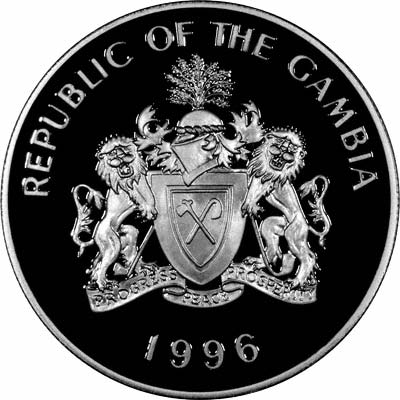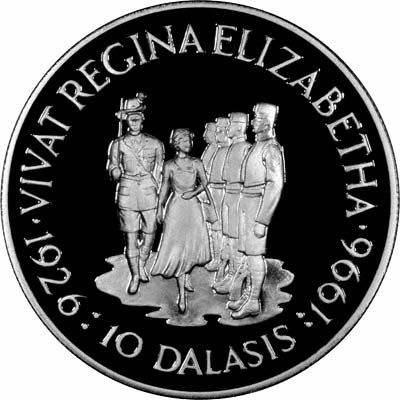| The Very Highest Quality Information... |
| Gambian Coins |
|
| ||||||||||||||||||||||||||||||||||||
 | ||||||||||||||||||||||||||||||||||||
|
| ||||||||||||||||||||||||||||||||||||
 | ||||||||||||||||||||||||||||||||||||
Early Gambian History
The first written records of the area date back to the 9th Century, produced by Arab traders and merchants who set up markets and trade links to the Arab world. Contact with the Arabs introduced Islam into the area, and the population was for the most part, gradually converted to Islam as a result over the succeeding centuries.
During its recorded history, Gambia is known to have formed part of the Ghana, Mali and Songhai Empires, before coming under Portuguese and later, English control.
English/British Colonial Rule
The transition to English rule began in 1588, when Antonio, Prior of Crato (and disputed King of Portugal) sold his trading rights there to Elizabeth I of England in 1588.
In 1651, Baltic Germans from Courland (modern day Latvia) established a fort on James Island (now known as Kunta Kinteh Island) to use as a trading base. This was eventually taken over by English traders in 1661, and administered by the Royal Adventurers in Africa Company, who traded in gold, ivory and fellow human beings.
The Gambia remained an important centre of the shameful trade until 1807, when the slave trade was abolished in the British Empire. However, the slave trade continued illegally until well into the 19th Century.
Crown Colony
Until 1888, the The Gambia was administered from Sierra Leone, but then became a separate Crown Colony. Its final borders were established after negotiations with the French in 1889.
In 1901, The Gambia was granted its own executive and legislative councils, and gradually became more internally autonomous. Banjul became an important naval stopover base for allied convoys during World War II, and many Gambians served in World War II, mainly in Burma. In 1963, The Gambia gained full internal autonomy and full independence two years later.
Independence
Following a popular referendum, Gambia became a republic in 1970. Gambia's Prime Minister, Sir Dawda Kairaba Jawara, became its President. The Gambia was considered to be politically stable until 1981, when an unsuccessful coup was launched against Jawara's rule, whilst he was absent attended the Royal Wedding in Britain. Although he managed to fight off the attempted overthrow, with the aid of troops from neighbouring Senegal, the fundamental causes of the coup, those of economic underdevelopment and chronic urban poverty remained.
Jawara attempted to reconcile with the opposition and was lenient with those who had plotted against him, however, whilst he seems to have been a man of considerably personal integrity, who refrained from resorting to the kind of brutal repression many of his fellow African leaders engaged in, evidence suggests that although he was not personally corrupt, officials working within the Gambia did, and Jawara ultimately seemed unequal to the task of dealing with Gambia's problems.
1994 Coup
In 1994 a coup, led by a young 29 year old Army officer, Yahya Jammeh ousted Jawara from power. He ruled as Chairman of the Armed Forces Provisional Ruling Council, and was elected president in 1996 under dubious circumstances. Jammeh's rule has not been as benevolent or well-intended as Jawara's. Violence, censorship and detention without trial have been some of the hallmarks of his regime, and Jammeh also claimed to have a found a herbal cure for AIDS and high blood pressure.
In 2009, it was reported that he had arrested over 1,000 Gambians on charges of witchcraft following the death of his aunt, which he ascribed to black magic by his political opponents. Jammeh remains the President of Gambia as of 2012.
Coinage of Gambia
Prior to the arrival of European traders, Gold dust and salt were commonly used as mediums of exchange in Gambia.
Initially, British sterling coinage was used in the Gambia, although coins specifically for use in British West Africa (including the Gambia) were issued in 1907 to discourage the drain of currency back to Britain. Also included in this coinage was the 1/10 of a penny, a denomination that did not exist in sterling coinage. The Penny and the Half-Penny were holed and issued in cupronickel. The 1936 British West Africa Penny was the only official coin of Edward VIII ever released for circulation.
In 1966, The Gambian pound was introduced to replace the British West African Pound at par. Pennies were issued in bronze, 3d were issued in aluminium-bronze and the rest of the denominations (6d, 1, 2 and 4 shillings) were issued in cupronickel. The unique 8 shilling piece, also struck in cupronickel, was issued in 1970. The Gambian pound was abolished in 1971, and was replaced by the dalasi, which was worth 4 shillings (or 1/5 of a pound).
The delasi was subdivided into 100 bututs. Coins of 1, 5, 10, 25, 50 bututs, 1 dalasi were issued for circulation upon the initial introduction of the dalasi. However, only the 25, 50 bututs and 1 delasi coin are typically seen in circulation today, based on specifications introduced after a coinage reform in 1998.
For Sale and Wanted
If you are interested in coins from the Gambia please see our product index:-
Gambian Coins
Gold Coins
We also have gold coins from the Gambian on our taxfreegold website:-
Gambian Gold Coins
| ...at the Lowest Possible Price |
|
32 - 36 Harrowside, Blackpool, Lancashire, FY4 1RJ, England.
Telephone (44) - (0) 1253 - 343081 ; Fax 408058; E-mail: info@chards.co.uk The URL for our main page is: https://24carat.co.uk |
Web Design by Snoop |